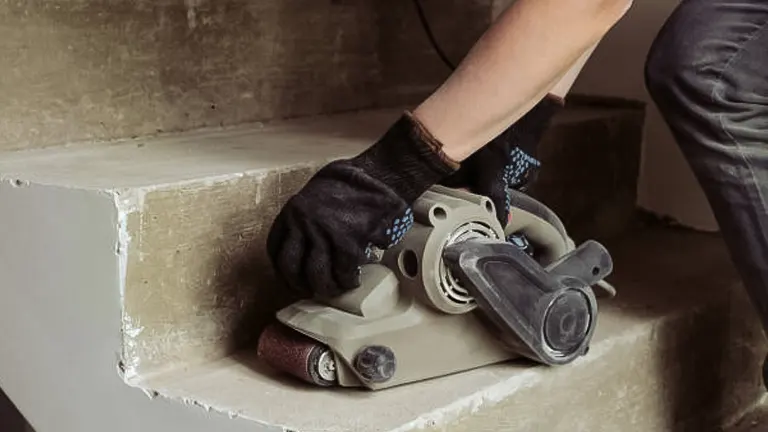Picture this: You’ve finally decided to tackle that long-overdue hardwood floor refinishing project. You’re ready to restore the natural beauty of your floors, bringing back the shine and luster that time has dulled. You’ve seen videos online of people using belt sanders to tackle this task, and it looks fast and efficient. But a nagging question lingers in your mind: can you really use a belt sander on hardwood floors?

Image: forestry.com
This question is one that plagues many homeowners embarking on a floor refinishing journey. While belt sanders can undoubtedly be a powerful tool, understanding the nuances of their use on hardwood flooring is crucial. This guide aims to shed light on the pros and cons of using a belt sander for this purpose and equip you with the knowledge to make an informed decision for your home.
Understanding the Powerhouse: The Belt Sander
Belt sanders are aptly named, boasting a powerful abrasive belt that spins rapidly, enabling them to quickly remove material from surfaces. They are often favored for large jobs like removing paint, rust, or sanding down rough wood surfaces. However, they were not specifically designed for hardwood floors. The sheer power of a belt sander can easily make quick work of wood, even with careful use. This makes them a double-edged sword for floor refinishing.
The Trade-Offs: Is a Belt Sander Right for Your Hardwood Floors?
Before you rush to your local hardware store for a belt sander, let’s weigh the pros and cons to see if it’s the right tool for your specific project.
Pros:
- Speed: Belt sanders are known for their speed and efficiency, making them an attractive option for large projects.
- Leveling Power: Their aggressive sanding action can effectively level uneven surfaces, particularly helpful for heavily damaged floors.
- Cost-Effective: If you’re comfortable using a belt sander and already own one, you can save money on labor costs compared to hiring a professional.
Cons:
- Risk of Damage: The powerful nature of belt sanders poses a high risk of damaging hardwood floors, particularly for those with intricate details or thin veneers.
- Difficulty of Control: Achieving consistent results with a belt sander requires significant skill and experience, making it a less forgiving tool than others.
- Dust Creation: Belt sanders create copious amounts of dust, necessitating diligent safety precautions and proper ventilation.
Expertise Matters: When to Seek Professional Help
While some DIY enthusiasts may find belt sanders tempting, it’s crucial to acknowledge that this powerful tool is best left to the professionals. Here are some situations where hiring a professional is highly recommended:
- Hardwood Floors With Thin Veneers: Thin veneers are more susceptible to damage from the vigorous sanding of a belt sander. Professional refinishers use specialized tools and techniques to handle these delicate surfaces.
- Intricate Designs: Hardwood floors with intricate designs or patterns are highly vulnerable to over-sanding with a belt sander.
- Limited Experience: If you’ve never refinished hardwood floors before, a professional can ensure your floors receive the proper care and attention.

Image: www.youtube.com
Alternatives to Belt Sanders: Finding the Right Tool
If you’re hesitant about using a belt sander on your hardwood floors, there are excellent alternatives that deliver a safe and effective refinish without the risk of damage.
- Drum Sander: Drum sanders offer more control and precision than belt sanders, making them suitable for small to medium-sized projects.
- Orbital Sander: These sanders are ideal for smoothing out rough patches and finishing touches, particularly on intricate floors or those with thin veneers.
- Hand Sanding: Though laborious, hand sanding is the gold standard for preserving intricate details and avoiding over-sanding.
Can You Use A Belt Sander On Hardwood Floors
Choosing the Right Approach: A Final Perspective
Ultimately, the decision of whether to use a belt sander for your hardwood floors should be guided by a careful evaluation of your project’s scope, your experience level, and the condition of your floors. If you’re unsure, consider seeking professional help. A professional refinisher can assess your floors, provide guidance, and ensure the job is done right. Remember, a well-maintained hardwood floor is a valuable asset, and prioritizing safety and expertise will help you enjoy its beauty for years to come.



/GettyImages-173599369-58ad68f83df78c345b829dfc.jpg?w=740&resize=740,414&ssl=1)


